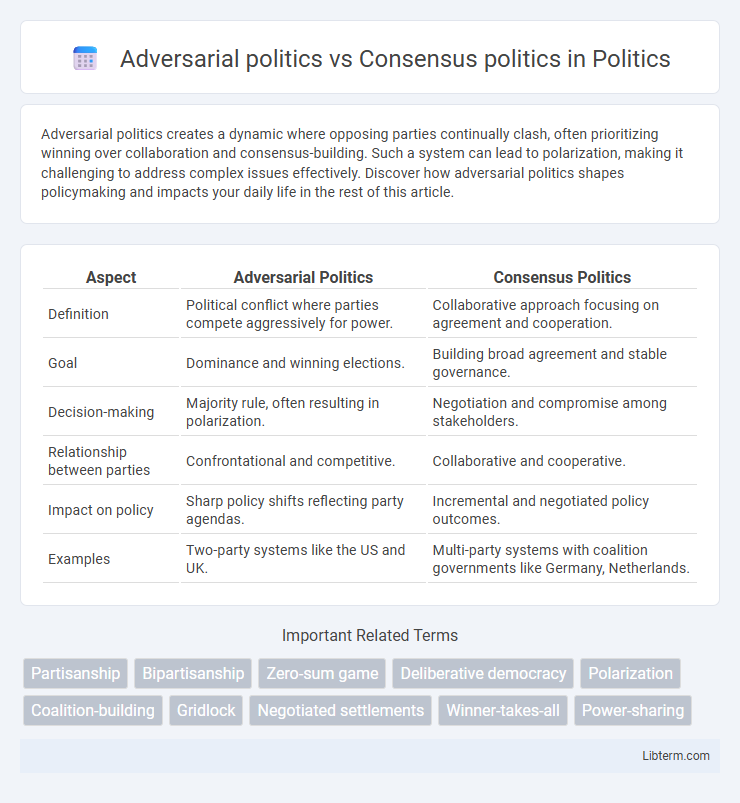Adversarial politics creates a dynamic where opposing parties continually clash, often prioritizing winning over collaboration and consensus-building. Such a system can lead to polarization, making it challenging to address complex issues effectively. Discover how adversarial politics shapes policymaking and impacts your daily life in the rest of this article.
Table of Comparison
| Aspect | Adversarial Politics | Consensus Politics |
|---|---|---|
| Definition | Political conflict where parties compete aggressively for power. | Collaborative approach focusing on agreement and cooperation. |
| Goal | Dominance and winning elections. | Building broad agreement and stable governance. |
| Decision-making | Majority rule, often resulting in polarization. | Negotiation and compromise among stakeholders. |
| Relationship between parties | Confrontational and competitive. | Collaborative and cooperative. |
| Impact on policy | Sharp policy shifts reflecting party agendas. | Incremental and negotiated policy outcomes. |
| Examples | Two-party systems like the US and UK. | Multi-party systems with coalition governments like Germany, Netherlands. |
Introduction to Adversarial and Consensus Politics
Adversarial politics centers on competition and conflict between opposing parties, emphasizing clear distinctions and power struggles to advance specific agendas. Consensus politics prioritizes collaboration and agreement, seeking common ground to create policies that reflect broad support across diverse groups. Understanding these contrasting approaches reveals how political systems manage conflict and cooperation in decision-making processes.
Defining Adversarial Politics
Adversarial politics is characterized by deep ideological divisions, intense party competition, and confrontational debate, often prioritizing winning over compromise. It features a zero-sum approach where opposing parties view each other as enemies rather than collaborators, leading to political polarization and gridlock. This model contrasts with consensus politics, which emphasizes cooperation, negotiation, and policy-making through broad agreement.
Understanding Consensus Politics
Consensus politics emphasizes collaboration, compromise, and inclusive decision-making to address societal challenges effectively. It prioritizes shared values and mutual understanding among diverse political actors, promoting stability and long-term policy solutions. This approach contrasts with adversarial politics, which often deepens divisions through confrontation and partisan conflict.
Historical Evolution of Political Approaches
Adversarial politics emerged prominently during the 19th century with the rise of mass political parties and competitive elections, emphasizing conflict and clear party distinctions. Consensus politics, by contrast, gained traction in the mid-20th century as societies sought stability and broad agreement post-World War II, prioritizing cooperation across political lines. The historical evolution reflects shifts from confrontational democratic models towards more collaborative governance frameworks, shaped by social, economic, and cultural contexts.
Key Features of Adversarial Politics
Adversarial politics is characterized by rigid party competition, where opposing factions engage in conflict to assert dominance and policy control, often leading to polarized decision-making and reduced cooperation. This model emphasizes confrontational debates, zero-sum outcomes, and strategic use of parliamentary procedures to challenge or obstruct opponents. Key features include heightened ideological divides, frequent political gridlock, and the prioritization of party loyalty over cross-party consensus.
Core Principles of Consensus Politics
Consensus politics centers on cooperation, compromise, and inclusive decision-making to achieve broad-based agreement across diverse political groups. It emphasizes stability, mutual respect, and the integration of multiple viewpoints to formulate policies that reflect common interests and long-term societal benefits. This approach contrasts sharply with adversarial politics, which prioritizes competition, polarization, and confrontational tactics.
Advantages and Disadvantages of Each Model
Adversarial politics fosters vigorous debate and clear policy alternatives, promoting accountability by exposing government shortcomings, but often leads to polarization and legislative gridlock. Consensus politics encourages collaboration and broad agreement, resulting in stable and inclusive policy outcomes, yet it may dilute strong positions and slow decision-making processes. Each model balances the trade-off between policy clarity and political harmony, influencing governance effectiveness and public trust.
Impact on Policy Making and Governance
Adversarial politics often results in polarized decision-making, slowing policy implementation and creating legislative gridlock that hampers effective governance. Consensus politics fosters collaboration among diverse political actors, enabling more inclusive and sustainable policy outcomes by prioritizing compromise and collective agreement. The contrasting dynamics influence government stability, public trust, and the adaptability of policies to address complex societal challenges.
Global Case Studies: Adversarial vs Consensus Systems
Adversarial politics, characterized by fierce party rivalry and zero-sum competition, is evident in the United States where a two-party system fosters significant ideological polarization and legislative gridlock. In contrast, consensus politics, prevalent in countries like Sweden and Switzerland, emphasizes power-sharing, coalition governance, and inclusive decision-making that promotes policy stability and social cohesion. Global case studies highlight that adversarial systems often drive rapid but contentious policy shifts, whereas consensus models tend to produce incremental and broadly supported reforms.
Future Prospects and Trends in Political Practices
Adversarial politics is likely to persist in highly polarized societies where ideological divisions and media fragmentation deepen public discord, influencing election strategies and legislative gridlock. Consensus politics may gain traction in regions prioritizing governance stability, enabling collaborative policymaking and long-term reforms through dialogue among diverse political actors. Emerging trends indicate a hybrid approach, leveraging digital platforms for citizen engagement while balancing ideological competition with pragmatic negotiation to address complex global challenges.
Adversarial politics Infographic

 libterm.com
libterm.com